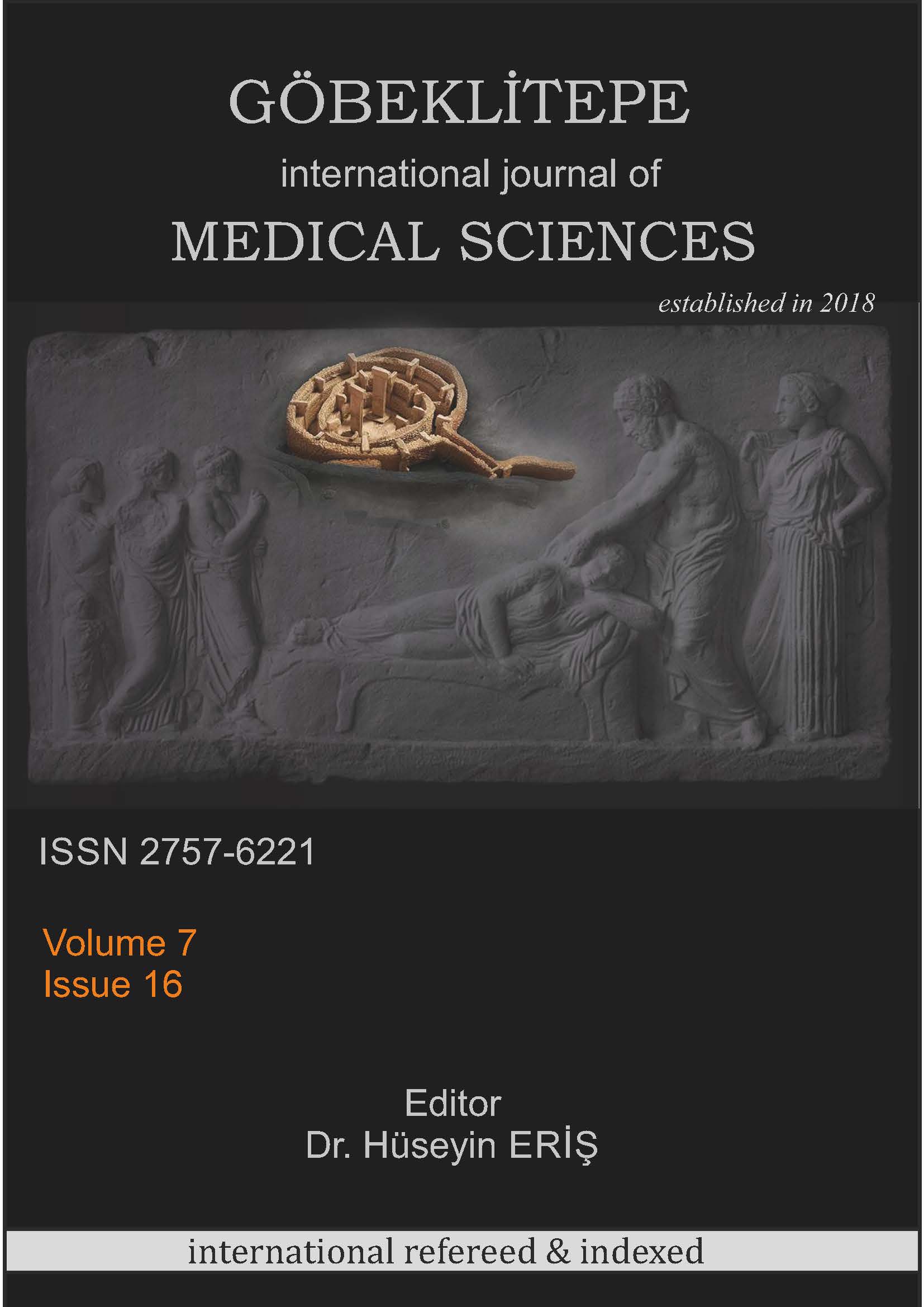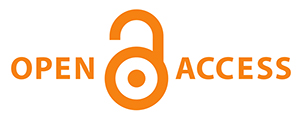THE CORRELATION BETWEEN THOUGHTS AND ANXIETY LEVELS OF THE NURSING STUDENTS ABOUT COVID-19
DOI:
https://doi.org/10.55433/gsbd/154Özet
Bu araştırma, öğrenci hemşirelerin yeni tip koronavirüs (COVID-19) hakkındaki düşünceleri ve kaygı düzeyleri arasındaki ilişkiyi belirlemek amacıyla yapılmıştır. Tanımlayıcı tipte olan çalışma, Nisan-Mayıs 2020 tarihleri arasında bir Sağlık Bilimleri Fakültesinin Hemşirelik Bölümünde öğrenim gören öğrencilerle yapılmıştır. Araştırmanın evrenini tüm öğrenciler oluştururken, örneklemini araştırmaya katılmaya gönüllü olan 346 hemşirelik öğrencisi oluşturdu. Çalışmaya başlamadan önce Sağlık Bakanlığı, Etik Kurul ve ilgili Kurumdan gerekli izinler alındı. Veriler, Anket ve Durumluk Kaygı Envanteri (DKE) ile çevrimiçi olarak toplanmıştır. Veriler, Anket ve Durumluk Kaygı Envanteri (DKE) ile çevrimiçi olarak toplanmıştır. SAI ortalama puanlarının 46,4±9,2 olduğu ve cinsiyet, ailede kronik hastalık, dezenfektan kullanma, yiyecek stoğu bulundurma, evde kal çağrısına uyma, stres yaşama ve inanma durumu ile SAI puan ortalamaları arasında korelasyon olduğu belirlendi. eğitim ve yaşam kalitesinin olumsuz etkilendiği (p<0.05). Öğrencilerin “orta” düzeyde kaygı yaşadıkları tespit edilmiştir.
Referanslar
https://www.who.int/emergencies/diseases/novel-coronavirus-2019, (Access Date: 20.03.2020).
hsgm.saglik.gov.tr (Access Date: 18.03.2020).
Rokni, M., Ghasemi, V., & Tavakoli, Z. (2020). Immune responses and pathogenesis of SARS-CoV-2 during an outbreak in Iran: Comparison with SARS and MERS. Reviews in medical virology, 30(3), e2107. https://doi.org/10.1002/rmv.2107.
Kolifarhood, G., Aghaali, M., Mozafar Saadati, H., Taherpour, N., Rahimi, S., Izadi, N., & Hashemi Nazari, S. S. (2020). Epidemiological and Clinical Aspects of COVID-19; a Narrative Review. Archives of academic emergency medicine, 8(1), e41.
Uğraş, Di̇kmen., A, Kına., M, Özkan, S., & İlhan, M. (2020). COVID-19 Epidemiology: What We Learned From The Pandemic. Journal of Biotechnology and Strategic Health Research, 4,29-36. DOI: 10.34084 / bshr.715153. (Original work published in Turkish).
Fathizadeh, H., Maroufi, P., Momen-Heravi, M., Dao, S., Köse, Ş., Ganbarov, K., Pagliano, P., Esposito, S., & Kafil, H. S. (2020). Protection and disinfection policies against SARS-CoV-2 (COVID-19). Le infezioni in medicina, 28(2), 185–191.
Özlü, A., & Öztaş, D. (2020). Taking Lessons from the Past in Combating the New Corona Pandemic (Covid-19). Ankara Med J, (2): 468-481. https://doi.org/10.5505/amj.2020.46547. (Original work published in Turkish).
Choi, S. H., Kim, H. W., Kang, J. M., Kim, D. H., & Cho, E. Y. (2020). Epidemiology and clinical features of coronavirus disease 2019 in children. Clinical and experimental pediatrics, 63(4), 125–132. https://doi.org/10.3345/cep.2020.00535.
Catton H. (2020). Global challenges in health and health care for nurses and midwives everywhere. International nursing review, 67(1), 4–6. https://doi.org/10.1111/inr.12578.
Lai, J., Ma, S., Wang, Y., Cai, Z., Hu, J., Wei, N., Wu, J., Du, H., Chen, T., Li, R., Tan, H., Kang, L., Yao, L., Huang, M., Wang, H., Wang, G., Liu, Z., & Hu, S. (2020). Factors Associated With Mental Health Outcomes Among Health Care Workers Exposed to Coronavirus Disease 2019. JAMA network open, 3(3), e203976. https://doi.org/10.1001/jamanetworkopen.2020.3976.
Aslan, H., & Pekince, H. (2020). Nursing students' views on the COVID-19 pandemic and their percieved stress levels. Perspectives in psychiatric care, 10.1111/ppc.12597. Advance online publication. https://doi.org/10.1111/ppc.12597
Savitsky, B., Findling, Y., Ereli, A., & Hendel, T. (2020). Anxiety and coping strategies among nursing students during the covid-19 pandemic. Nurse education in practice, 46, 102809. https://doi.org/10.1016/j.nepr.2020.102809.
Oner, N., & Le Compte, A. (1983). State and Trait Anxiety Inventory Handbook, Istanbul: Boğaziçi University Publications. (Original work published in Turkish).
Çıkaroğlu, O. C. (2011). Investigation of Perceptions Associated with Swine Flu (H1N1) Epidemic in the Context of Variables of Anxiety and Avoidance. Turkish Journal of Psychology. 26 (67); 49-64. (Original work published in Turkish).
Taylor, M. R., Agho, K. E., Stevens, G. J., & Raphael, B. (2008). Factors influencing psychological distress during a disease epidemic: data from Australia's first outbreak of equine influenza. BMC public health, 8, 347. https://doi.org/10.1186/1471-2458-8-347.
Lau, J. T., Yang, X., Pang, E., Tsui, H. Y., Wong, E., & Wing, Y. K. (2005). SARS-related perceptions in Hong Kong. Emerging infectious diseases, 11(3), 417–424. https://doi.org/10.3201/eid1103.040675.
Goulia, P., Mantas, C., Dimitroula, D., Mantis, D., & Hyphantis, T. (2010). General hospital staff worries, perceived sufficiency of information and associated psychological distress during the A/H1N1 influenza pandemic. BMC infectious diseases, 10, 322. https://doi.org/10.1186/1471-2334-10-322.
Balkhy, H. H., Abolfotouh, M. A., Al-Hathlool, R. H., & Al-Jumah, M. A. (2010). Awareness, attitudes, and practices related to the swine influenza pandemic among the Saudi public. BMC infectious diseases, 10, 42. https://doi.org/10.1186/1471-2334-10-42.
Elrggal, M. E., Karami, N. A., Rafea, B., Alahmadi, L., Al Shehri, A., Alamoudi, R., Koshak, H., Alkahtani, S., & Cheema, E. (2018). Evaluation of preparedness of healthcare student volunteers against Middle East respiratory syndrome coronavirus (MERS-CoV) in Makkah, Saudi Arabia: a cross-sectional study. Zeitschrift fur Gesundheitswissenschaften = Journal of public health, 26(6), 607–612. https://doi.org/10.1007/s10389-018-0917-5.
Eki̇z, T., Ilıman, E., & Dönmez, E. (2020). COMPARISON OF INDIVIDUALS HEALTH ANXIETY LEVELS AND PERCEPTION OF CONTROL OF COVID-19. International Journal of Health Management and Strategies Research, 6 (1), 139-154. Retrieved from https://dergipark.org.tr/tr/pub/usaysad/issue/54067/729076. (Original work published in Turkish).
Frankenberg, E., Sikoki, B., Sumantri, C., Suriastini, W., & Thomas, D. (2013). Education, Vulnerability, and Resilience after a Natural Disaster. Ecology and society : a journal of integrative science for resilience and sustainability, 18(2), 16. https://doi.org/10.5751/ES-05377-180216.
Chang, J., Yuan, Y., & Wang, D. (2020). Nan fang yi ke da xue xue bao = Journal of Southern Medical University, 40(2), 171–176. https://doi.org/10.12122/j.issn.1673-4254.2020.02.06.
Ikhlaq, A., Bint-e-Riaz, H., Bashir, I., & Ijaz, F. (2020). Awareness and Attitude of Undergraduate Medical Students towards 2019-novel Corona virus. Pak J Med Sci. 36(COVID19-S4):COVID19-S32-S36. doi: https://doi.org/10.12669/pjms.36.COVID19-S4.2636.
Yıldırım, N., Karaca, A., Ankaralı, H., Açıkgöz, F., & Akkuş, D. (2016). Stress experienced by Turkish nursing students and related factors. Clin Exp Health Sci. 6(3): 121-128. https:// dx.doi.org/ 10.5152/ clinexphealthsci.2016.061.
Çelebi, C. (2020). Nursing Care in Patients Diagnosed with Covid-19 ”Ege Clinical Medicine Journal. 58(1)35-40). (Original work published in Turkish).
Kwok, K. O., Li, K. K., Chan, H., Yi, Y. Y., Tang, A., Wei, W. I., & Wong, S. (2020). Community Responses during Early Phase of COVID-19 Epidemic, Hong Kong. Emerging infectious diseases, 26(7), 1575–1579. https://doi.org/10.3201/eid2607.200500.
Zhang, W. R., Wang, K., Yin, L., Zhao, W. F., Xue, Q., Peng, M., Min, B. Q., Tian, Q., Leng, H. X., Du, J. L., Chang, H., Yang, Y., Li, W., Shangguan, F. F., Yan, T. Y., Dong, H. Q., Han, Y., Wang, Y. P., Cosci, F., & Wang, H. X. (2020). Mental Health and Psychosocial Problems of Medical Health Workers during the COVID-19 Epidemic in China. Psychotherapy and psychosomatics, 89(4), 242–250. https://doi.org/10.1159/000507639.
Wang, C., Pan, R., Wan, X., Tan, Y., Xu, L., Ho, C. S., & Ho, R. C. (2020). Immediate Psychological Responses and Associated Factors during the Initial Stage of the 2019 Coronavirus Disease (COVID-19) Epidemic among the General Population in China. International journal of environmental research and public health, 17(5), 1729. https://doi.org/10.3390/ijerph17051729.
Bostan, S., Erdem, R., Öztürk, Y. E., Kılıç, T., & Yılmaz, A. (2020). The Effect of COVID-19 Pandemic on the Turkish Society. Electronic Journal of General Medicine, 17(6), em237. https://doi.org/10.29333/ejgm/7944.
Naja, F., Hamadeh, R. (2020). Nutrition amid the COVID-19 pandemic: a multi-level framework for action. Eur J Clin Nutr ; 74, 1117–1121. https://doi.org/10.1038/s41430-020-0634-3.
Baker, S. R., Farrokhnia, R. A., Meyer, S., Pagel, M., & Yannelis, C. (2020). How Does Household Spending Respond to an Epidemic Consumption During the COVID-19 Pandemic. NBER Working Paper No. 26949.
Long, N. N., & Khoi, B. H. (2020). An Empirical Study about the Intention to Hoard Food during COVID-19 Pandemic. Eurasia Journal of Mathematics, Science and Technology Education, 16(7), em1857. https://doi.org/10.29333/ejmste/8207.
Çokuğraş, H., & Önal, P. (2020). SARS-CoV-2 infection in children. Turk Pediatri Ars. 55 (2): 95-102. (Original work published in Turkish).
Sandalcı, B., Uyaroğlu, O. A., Sain Güven, G. (2020). Role, Importance and Recommendations of Chronic Diseases in COVID-19 "FLORA; 25 • doi: 10.5578 / flora.69700. (Original work published in Turkish).
Altın, Z. (2020). The Elderly in the Covid-19 Pandemic. The Journal of Tepecik Education and Research Hospital; 30 (Additional number): 49-57). (Original work published in Turkish).
Onder, G., Rezza, G., & Brusaferro, S. (2020). Case-Fatality Rate and Characteristics of Patients Dying in Relation to COVID-19 in Italy. JAMA. 323(18):1775–1776. doi:10.1001/jama.2020.4683.
Bai, Y., Lin, C. C., Lin, C. Y., Chen, J. Y., Chue, C. M., & Chou, P. (2004). Survey of stress reactions among health care workers involved with the SARS outbreak. Psychiatric services (Washington, D.C.), 55(9), 1055–1057. https://doi.org/10.1176/appi.ps.55.9.1055.
Robertson, E., Hershenfield, K., Grace, S. L., & Stewart, D. E. (2004). The psychosocial effects of being quarantined following exposure to SARS: a qualitative study of Toronto health care workers. Canadian journal of psychiatry. Revue canadienne de psychiatrie, 49(6), 403–407. https://doi.org/10.1177/070674370404900612.
Üstün, Ç., & Özçi̇ftçi̇, S. (2020). Effects of the COVID-19 Pandemic on Social Life and Ethical Plane: An Evaluation Study. Anatolian Clinic the Journal of Medical Sciences, 25 (Special Issue on COVID 19), 142-153. DOI: 10.21673 / anaadoluklin.721864. (Original work published in Turkish).
Cao, W., Fang, Z., Hou, G., Han, M., Xu, X., Dong, J., & Zheng, J. (2020). The psychological impact of the COVID-19 epidemic on college students in China. Psychiatry research, 287, 112934. https://doi.org/10.1016/j.psychres.2020.112934.
Ferrel, M. N., & Ryan, J. J. (2020). The Impact of COVID-19 on Medical Education. Cureus, 12(3), e7492. https://doi.org/10.7759/cureus.7492.
İndir
Yayınlanmış
Sürüm
- 2023-03-29 (3)
- 2023-03-29 (2)
- 2023-03-22 (1)
Nasıl Atıf Yapılır
Sayı
Bölüm
Lisans
Telif Hakkı (c) 2023 Göbeklitepe Sağlık Bilimleri Dergisi

Bu çalışma Creative Commons Attribution 4.0 International License ile lisanslanmıştır.




